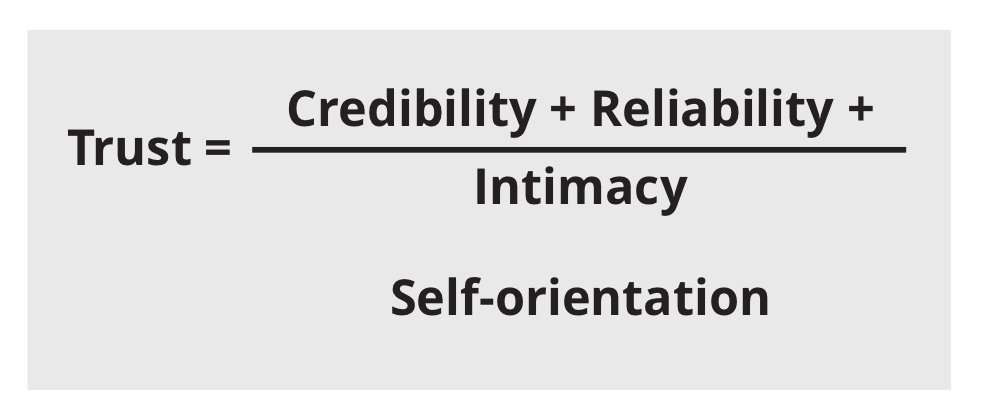Karen Dean and Sam Humphrey explore the role of trust in coaching relationships
A coaching conversation is potentially an intimate and deeply personal interaction. Deciding whether or not we might trust our coach is central to the quality of the outcome, for both parties. Coaches occasionally are unsure whether they can trust their clients. Establishing trust is a two-way process.
What is trust? We know this is a mental construct, a blend of thought and feeling, of paramount importance. Labelled as a value, it speaks to what we believe about ourselves and others. It has very personal meaning and is expressed through our behaviours.
Values and beliefs
My values are those things which I hold dear, or things to which I aspire or admire in others. Some of our values are more deep-rooted than others. Most of us would like to say we are honest, and there will also be times when we have told white lies, for good reason, yet we have not been honest. A good way to identify our values is to think of a time they have been tested, a crucible moment when we had to decide what the ‘right’ or ‘best’ thing was to do. What values showed up in that moment? What values was I honouring? This will give insight into what is really important, personally.
Beliefs inform our behaviour in an active way. If I believe that to walk under a ladder is unlucky, I will cross the road to avoid doing that. Looking at beliefs in a coaching relationship can also provide some useful insights about who I am as a coach. If I believe leaders are born and not made, this will impact whom I choose to coach and how I coach them.
Trust is likely, when ‘who I am’ is an expression of my ‘values and beliefs’ and I honour these by behaving in alignment, in a recognisable way. Behaving counter to my stated values threatens trust. Trust promotes a feeling of safety which leads us to connect with, depend upon, be advised by, and become open to sharing vulnerabilities. We believe we shall not be taken advantage of when we trust another. Fear of injury or detriment or loss will lead to hesitation, resistance or defence and trust will be elusive.
Trust is at the heart of making a change. If we are experiencing doubt in a relationship, a sense that we may become the loser or judged or left out, we cannot open ourselves for bonding with others. Our creative future thinking is blocked. We become binary in our process ‘win/lose’; ‘in/out’; ‘right/wrong’. We are compelled to defend, avoid, appease, or freeze at the mercy of our hormones.
Verbal coaching contract
At the heart of coaching is the principle that a trusting relationship will be created. This is crafted and made explicit through the verbal coaching contract. Fundamentally ‘what is the outcome of the coaching session’? ‘How will the client know they have this’? ‘How will the coach and client work together to achieve this’? ‘What will they do to mitigate any difficulties’?
In our book Coaching Stories: Flowing and Falling of Being a Coach, the challenges of when we failed to foster the conditions for trust, feature in differing ways in our Falling stories. The reflective statements posed at the end of each story, ‘what I wish they’d told me’ and ‘what I wish I’d asked’ highlight the pain, shame and learning on our real-life journeys as growing coaches. The good practice Flowing stories highlight how deep trust was established with others with whom we worked.
Deeper exploration of trust is advised, with clients. The parameters of confidentiality need to be explicit. Coach and client need to agree that neither will share any other content from the conversation with third parties, without express permission. This enables sensible handling of sponsor, manager, or HR relationships within the system. The conditions where the coach would be compelled to break confidentiality are for example, when the client may have broken the law, or potentially about to inflict harm on others, or themselves. In these circumstances, the coach will be ethically guided to speak to relevant authorities.
The contracting conversation between coach and client will encompass note-taking and the handling of data. The coaching contract is likely also to address mutual respect for time. The responsibilities for arranging appointments and the consequences of cancellations or postponements. Conditions for remuneration will feature. It might also be useful to talk about the expectations for closing the relationship well. Boundaries, clarity and specificity help us to feel safer and more likely to engage with our coach.
In his book The Trusted Advisor (2001), David Maister introduces the trust equation as a way to view professional relationships:

Each of these elements are important in establishing and building trust. We need to be viewed as credible to do what we are doing, are we fit for purpose? Can I rely on you to do what you say you will do? Will you share an appropriate level of intimacy with me in our relationship? Will you share personal stuff with me or is it business only? Can I be vulnerable?
Self-orientation
Self-orientation in a business relationship is inevitable. We all need something from our relationships, so the issue here is not just about having self-orientation, it is also about how we handle it. If I am negotiating a point with you, do I leave you feeling manipulated or conned or do I leave you clear on what is important to me and why, so that you know you have a choice in what you do?
Trust is fundamental to coaching. In the coaching conversation, the coach and client need to feel safe when working together. Both need to know they can trust each other so that they engage in both meaningful and useful coaching.
*Please note: This is a commercial profile











